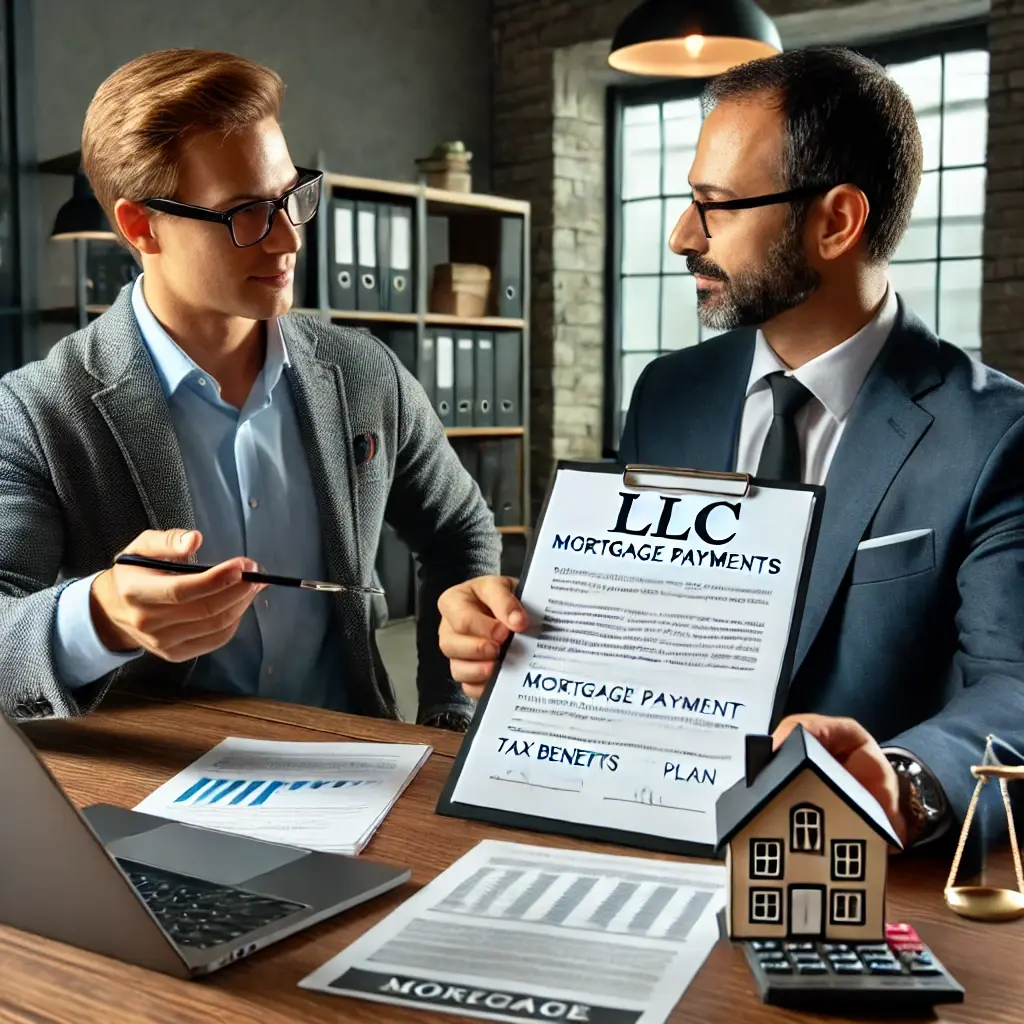LLC and Mortgages
Forming a Limited Liability Company (LLC) offers business owners flexibility, liability protection, and tax advantages. However, when it comes to using business funds for personal expenses, many entrepreneurs ask, Can My LLC Pay My Mortgage Payment? This question is important because mixing personal and business finances can lead to tax complications and legal risks. Understanding the rules and best practices surrounding this topic is crucial to protect your business structure and avoid potential penalties. In this guide, we’ll explore how LLC finances relate to personal obligations and provide insights to help you manage mortgage payments legally and effectively.
What Is an LLC and How Does It Work?
An LLC, or Limited Liability Company, is a business structure that separates personal assets from business liabilities. Business owners often form an LLC to protect personal assets when owning rental properties. The purpose of the LLC is to manage rental properties under the LLC name. This setup ensures personal and business finances remain distinct, helping you comply with IRS rules and avoid mixing personal use with business operations.
Basics of Getting a Mortgage
To get a mortgage, lenders assess your financial history, including tax returns and personal finance details. For rental properties, a business owner can consider transferring the property into an LLC. However, interest rates for mortgages under an LLC may differ from personal mortgage rates. Work with a tax professional to ensure you maximize tax benefits, such as deducting mortgage interest, and handle the process efficiently.
Benefits of Using an LLC to Get a Mortgage

Limited Liability Protection for LLC Members
LLC members benefit from limited liability protection, which shields personal assets in case of business debts or lawsuits. By keeping rental properties under an LLC name, you reduce risks to your personal name and assets. This separation also helps avoid capital gains tax complications when selling properties owned by the LLC. A tax professional can guide you on maintaining compliance while enjoying these protections.
Reducing Personal Liability Through an LLC
Reducing personal liability is one of the key reasons many property owners choose to form an LLC. By owning rental properties under your business instead of your personal name, you protect your personal assets from creditors in case of legal or financial issues involving the LLC. Additionally, maintaining a clear distinction between personal and business finances not only supports better tax reporting but also reinforces the integrity of the LLC’s structure. This strategy can be particularly beneficial when thinking about how My LLC Pay My Mortgage obligations can be managed while safeguarding personal wealth.
Managing Rental Income with an LLC
Managing rental income becomes more efficient when using an LLC. By keeping business income separate, owners can use funds from the LLC’s account to directly cover mortgage payments. This arrangement simplifies financial tracking and supports tax benefits, such as deductions on mortgage interest and property-related expenses. Ensuring that My LLC Pay My Mortgage is handled properly, with the guidance of a tax professional, can help optimize savings and compliance with IRS regulations. This approach is ideal for protecting both personal finances and business interests.
Steps to Buy a House with an LLC
Buying a house with an LLC involves creating a solid plan for property ownership under the name of the LLC. Start by ensuring the LLC has business credit to qualify for mortgage loans. You’ll also need to consider tax implications and set up a business account to manage business expenses. Working with professionals ensures the property under an LLC is properly structured for business use and tax purposes.
Preparing Your LLC for Property Ownership
To prepare your LLC for property ownership, ensure the business account is ready to handle expenses like property taxes and mortgage payments. Establish the name of the LLC for legal documentation and separate business and personal finances. You should also assess potential tax benefits and obligations from a tax perspective. Consulting a tax professional will help you navigate tax laws and ensure compliance with tax obligations.
Applying for a Mortgage Under an LLC
When applying for a mortgage under an LLC, lenders often require you to personally guarantee the mortgage. The LLC may need business credit and sufficient business assets to secure approval. Mortgage loans under an LLC are evaluated based on business income, not your personal tax return. Seek tax advice to understand the mortgage interest deduction and how to structure payments through the LLC to pay the mortgage.
Working with a Mortgage Lender
A mortgage lender evaluates your LLC’s business credit and financial stability when approving loans. Be prepared to show the LLC’s business account activity, tax returns, and property management plans. A lender may require you to personally guarantee the mortgage if the LLC lacks credit history. Open communication with the lender ensures you understand tax implications and any conditions tied to the mortgage loans.
Challenges of LLC Mortgages

Obtaining a mortgage under an LLC can be challenging due to stricter requirements for business loans. Lenders often ask for a personal guarantee, tying business and personal obligations. Tax implications, such as the inability to claim certain deductions on personal tax returns, also arise. Managing business assets and meeting property tax obligations require careful planning to avoid financial strain on the LLC.
Higher Mortgage Payments with LLC Loans
Mortgage loans for properties owned by the LLC often come with higher interest rates and larger payments. This is because lenders view business loans as higher risk compared to personal mortgages. The LLC must use its business account to pay the mortgage, which can strain cash flow. However, mortgage interest deduction and proper tax planning can offset some costs for tax purposes.
Restrictions on Primary Residence Mortgages
Using an LLC to own a primary residence poses restrictions, as LLCs are typically designed for business use. Lenders rarely offer loans for personal use through an LLC. Additionally, you cannot claim personal tax benefits, like deductions for personal tax returns, on a property owned by the LLC. It’s essential to consult a tax professional to explore options that align with tax law and your financial goals.
Title and Mortgage Requirements for LLCs
Properties owned by the LLC must have the title and mortgage in the name of the LLC. This separation ensures clear distinctions between business and personal ownership. For tax purposes, all payments, including property taxes, must come from the LLC’s business account. Proper documentation of business expenses, tax obligations, and property management ensures compliance and minimizes potential tax issues for member LLCs.
Strategies for Running a Rental Business with an LLC
Running a rental business with an LLC involves separating personal and business assets to protect your finances. Use a business bank account for managing income and expenses, including making the mortgage payments. The LLC provides a legitimate business structure, helping minimize tax through proper tax preparation. Consult a tax attorney to handle legal and tax implications effectively while maintaining an LLC as a compliant business entity.
Maximizing Rental Income While Protecting Assets
To maximize rental income, ensure your property is managed efficiently and generate interest income by reinvesting profits. An LLC protects personal assets if the business faces financial issues. Maintaining clear tax reporting and leveraging mortgage deduction benefits help reduce taxable income. Regularly consult with a tax attorney to stay updated on tax laws and strategies to minimize tax obligations for federal tax purposes.
Managing a Property Owned by My LLC
Managing a property under an LLC involves keeping all business-related transactions in a business bank account. Ensure the LLC pays the mortgage and property expenses directly to maintain compliance. Proper tax preparation and reporting are crucial for federal tax purposes, particularly if the LLC generates interest income. By separating personal and business assets, you ensure the LLC remains a legitimate business entity, protecting yourself from liability.
Tips for Member LLCs to Maintain Compliance
Member LLCs must follow legal and tax requirements to avoid penalties. Always maintain a business bank account and use it for all transactions, including making the mortgage payments. File individual tax returns and federal tax reports accurately, reflecting the basis in their LLC interest. Regularly consult with a tax attorney to address self-employment tax, ensure proper tax reporting, and minimize tax obligations while maintaining an LLC’s credibility.
FAQS:
Can an LLC Get a Mortgage for a Primary Residence?
An LLC could get a mortgage loan for a property, but lenders may hesitate if the purpose is personal use rather than a legitimate business need. Primary residences often involve individual tax returns and personal guarantees, which conflict with an LLC’s structure. To ensure compliance, consult a tax attorney to navigate the legal and tax implications of getting an LLC mortgage for such purposes.
What Do Lenders Look For in LLC Applications?
Lenders evaluate the LLC’s business bank account, tax reporting, and financial health before approving a mortgage loan. They may require members to personally guarantee the loan if the LLC lacks sufficient credit history. Mortgage documents must prove the LLC is a legitimate business entity. Lenders also consider the risk of default on the loan and ensure the LLC provides a solid financial foundation.
How to Transition a Property Title and Mortgage to an LLC?
To transition a property to the LLC, first transfer the title to the LLC’s name. Notify the lender about the existing mortgage and discuss how to align it with the LLC. If the LLC fails to meet requirements or defaults on payments, it could affect your liability. Work with a tax attorney to address the legal and tax implications, ensuring compliance and minimizing risks during the process.
